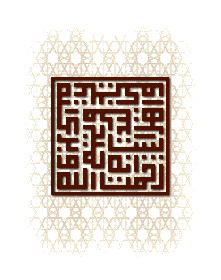 |
Al-Hussein |
|
| Al-Hussein was the
second son of Prophet Muhammad’s daughter Fatima, and his father, ‘Ali ibn Abi
Talib, was the Prophet’s cousin. His life and death are central in the Twelve-Imam
Shi’ite history. The Prophet Muhammad (p.b.u.h) named him. Al-Hussein translated into
English means the ‘little beautiful one. Following the death of Mu’awiyah, the Umayyad governor of Damascus, his son Yazid became caliph without holding the usual consultations. No caliph had been so succeeded by his son before and with Yazid’s reputation as a reveler, subsequent dissension arose as to who best suited the Caliphate. Throughout many cities, notables refused to swear allegiance to Yazid, among them was Al-Hussein the Prophet’s grandson. Many believed that only the Family of the Prophet could overcome the powerful Mu’awiyah clan, and Al-Hussein, who’s older brother Al-Hassan had died ten years earlier, was ready to take up the cause. At the invitation of the Shi’ite Kufans he left al-Medina al-Munawwara and traveled across the desert with an army of 600 to Kufa (in Iraq) to seek more supporters. However, and under the orders of Yazid, the governor of Iraq with 4000 soldiers intercepted Al-Hussein and his troops. Besieged and with their water supply cut-off for eight days, Al-Hussein and his small army went into the ill-fated battle at Karbala, resulting in his death. The martyrdom of Al-Hussein was to become a symbol of capital importance for the Shi’ites. Among Shi’ites there is a historical and ever-present sense of guilt which centers around their misleading invitation to Al-Hussein and their ensuing betrayal by not coming to his aid. Al-Hussein might be dead but his memory lives on; becoming the symbol for the weak and defenseless. His death is enacted in a martyrdom play (Ta’ziyah) which is performed by Shi’ites for the anniversary of Kerbala (10th Muharram, the first month of the Hijra year). For the Sunnis and Shi’ites alike, the event is tragic and a dreadful murder of the second closest descendant of the Prophet. The anniversary of his death is the most tragic day of the year for the Shi’ites and for the Sunnis it remains a sad and mournful day. Since Safavid times, the site of the tomb where Al-Hussein lays, has been the most important shrine for Twelve-Imam Shi’ite. |
||